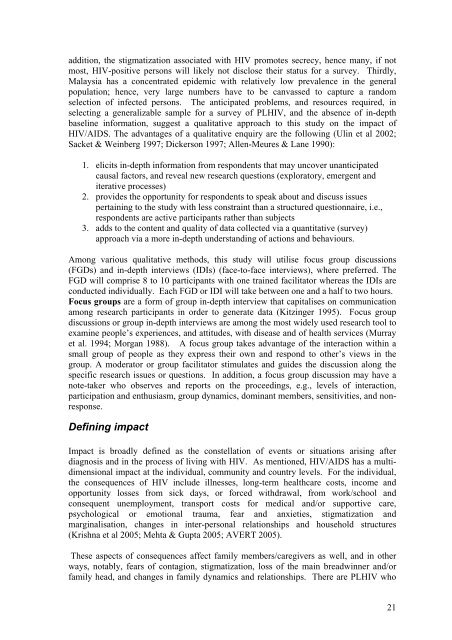Download this publication - AIDS Data Hub
Download this publication - AIDS Data Hub
Download this publication - AIDS Data Hub
You also want an ePaper? Increase the reach of your titles
YUMPU automatically turns print PDFs into web optimized ePapers that Google loves.
addition, the stigmatization associated with HIV promotes secrecy, hence many, if notmost, HIV-positive persons will likely not disclose their status for a survey. Thirdly,Malaysia has a concentrated epidemic with relatively low prevalence in the generalpopulation; hence, very large numbers have to be canvassed to capture a randomselection of infected persons. The anticipated problems, and resources required, inselecting a generalizable sample for a survey of PLHIV, and the absence of in-depthbaseline information, suggest a qualitative approach to <strong>this</strong> study on the impact ofHIV/<strong>AIDS</strong>. The advantages of a qualitative enquiry are the following (Ulin et al 2002;Sacket & Weinberg 1997; Dickerson 1997; Allen-Meures & Lane 1990):1. elicits in-depth information from respondents that may uncover unanticipatedcausal factors, and reveal new research questions (exploratory, emergent anditerative processes)2. provides the opportunity for respondents to speak about and discuss issuespertaining to the study with less constraint than a structured questionnaire, i.e.,respondents are active participants rather than subjects3. adds to the content and quality of data collected via a quantitative (survey)approach via a more in-depth understanding of actions and behaviours.Among various qualitative methods, <strong>this</strong> study will utilise focus group discussions(FGDs) and in-depth interviews (IDIs) (face-to-face interviews), where preferred. TheFGD will comprise 8 to 10 participants with one trained facilitator whereas the IDIs areconducted individually. Each FGD or IDI will take between one and a half to two hours.Focus groups are a form of group in-depth interview that capitalises on communicationamong research participants in order to generate data (Kitzinger 1995). Focus groupdiscussions or group in-depth interviews are among the most widely used research tool toexamine people’s experiences, and attitudes, with disease and of health services (Murrayet al. 1994; Morgan 1988). A focus group takes advantage of the interaction within asmall group of people as they express their own and respond to other’s views in thegroup. A moderator or group facilitator stimulates and guides the discussion along thespecific research issues or questions. In addition, a focus group discussion may have anote-taker who observes and reports on the proceedings, e.g., levels of interaction,participation and enthusiasm, group dynamics, dominant members, sensitivities, and nonresponse.Defining impactImpact is broadly defined as the constellation of events or situations arising afterdiagnosis and in the process of living with HIV. As mentioned, HIV/<strong>AIDS</strong> has a multidimensionalimpact at the individual, community and country levels. For the individual,the consequences of HIV include illnesses, long-term healthcare costs, income andopportunity losses from sick days, or forced withdrawal, from work/school andconsequent unemployment, transport costs for medical and/or supportive care,psychological or emotional trauma, fear and anxieties, stigmatization andmarginalisation, changes in inter-personal relationships and household structures(Krishna et al 2005; Mehta & Gupta 2005; AVERT 2005).These aspects of consequences affect family members/caregivers as well, and in otherways, notably, fears of contagion, stigmatization, loss of the main breadwinner and/orfamily head, and changes in family dynamics and relationships. There are PLHIV who21















